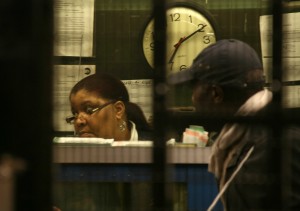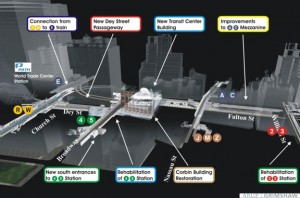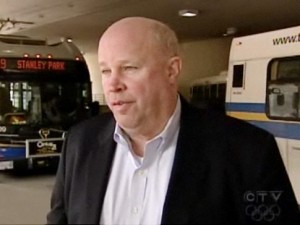Last week was exciting for NYC Tracks. We live-blogged from four public hearings held in Queens, the Bronx, Brooklyn and Manhattan. Here are some of our visual impressions of the events. For a brief discussion of the hearings by the five NYC Tracks bloggers, check out our podcast.
Archive | Politics and Money
Photos of last week's MTA public hearings
Posted on 09 March 2010.
Posted in News, Politics and Money1 Comment
VIDEO: The S60 — Low Ridership, Big Responsibility
Posted on 08 March 2010.
The S60 bus claims the lowest ridership in the city’s system. For MTA officials, it’s too small to justify the cost. But for some students, it’s the only mass transit option for commuting to school. The route also carries senior citizens up and down a hill that turns treacherous in the winter.
It was one of several cuts that headlined the MTA’s Staten Island public hearing last week.
— Aashish Jethra
Posted in Commuters, News, Politics and Money1 Comment
Nadler Finds Funds For Fulton
Posted on 07 March 2010.
Originally posted on the NYC Delegation blog by Colby Hamilton.
Congressman Nadler announced on March 5th that he has secured $156 million in stimulus funding to help complete the new Fulton Street
Transit Center in Lower Manhattan. The new hub is located just blocks from the World Trade Center site but has faced a number of setbacks since its groundbreaking in 2004. From the press release:
“The Fulton Street Transit Center represents a significant new boost to New York City’s subway system, and an important economic development initiative for Lower Manhattan,” said Nadler. “This major project will generate good construction and transit jobs, better connect Downtown’s subway grid, and provide much-need investment in a neighborhood that is still rebuilding since 9/11.”
The facilities are set to open in 2014. The MTA has already used millions of dollars in stimulus funding to help pay for the project.
While the additional $156 million will be welcomed by the state agency, the funding priorities in this situation raise a number of concerns.
The MTA is telling New Yorkers it faces a budget gap of nearly $800 million. To make up the difference, the agency is planning on cutting back service on subways and buses, completely eliminating some routes. New York City school children are also being told at this point that the MTA will stop subsidizing their daily commute.
A spokesperson with Nadler’s office did indicate the congressman was working with the MTA to see how the Federal government could help keep the service cuts from happening. Still, for New Yorkers furious with the state agency over the proposed cuts, putting stimulus funds into a project already way over budget, while kids are being told they’ll have to pay to get to school, could be a situation Congressman Nadler and the MTA find hard to justify to the public.
Posted in News, Politics and MoneyComments Off on Nadler Finds Funds For Fulton
SLIDESHOW: Budget Cuts Outrage Brooklynites
Posted on 05 March 2010.
The public hearings on the MTA’s proposed cuts are over for New York City (there is one more scheduled in Long Island on Monday). The Brooklyn hearing created the most news. We live blogged the event and got dozens of pictures of the altercations that led to the arrests of several audience members. Check out how the contentious evening unfolded in our slideshow:
(note: to see the captions, you have to expand to full screen, by clicking the button in the slideshow’s lower right corner)
— Simone Sebastian
Posted in News, Politics and MoneyComments Off on SLIDESHOW: Budget Cuts Outrage Brooklynites
EXTRA! EXTRA! TONIGHT! NYC TRACKS IS LIVE BLOGGING FROM TWO PUBLIC MEETINGS
Posted on 03 March 2010.
Our intrepid bloggers will be live blogging from two MTA public meetings tonight. The meetings – held simultaneously – will take place in the Bronx and in Brooklyn.
Tune in and join the conversation.
BROOKLYN < ——— > THE BRONX
Posted in Capital Project, Commuters, News, Politics and MoneyComments Off on EXTRA! EXTRA! TONIGHT! NYC TRACKS IS LIVE BLOGGING FROM TWO PUBLIC MEETINGS
VIDEO: Upgrades, Downgrades Come Back-to-Back for MTA
Posted on 28 February 2010.
It was a busy week for the MTA’s public relations department – and an emotional one for subway workers and riders.
On the up side, the transit agency announced that it was installing more countdown clocks in subway stations and launching a test-run of new security cameras on trains.
And transit chief Thomas Prendergast said he wants to infuse $700 million into station improvements during the next five years.
“I don’t want to say that because of our budget issues, we can’t make improvements,” Prendergast told the Daily News.
Oh yeah…those budget issues. In the same week, the MTA announced it would lay off 15 percent of its subway station agents to save money.
Will New Yorkers agree with the MTA’s priorities? We’ll find out at this week’s public hearings.
Here’s a review of the issues at stake. Let us know where you stand.
– Simone Sebastian
Posted in Commuters, News, Politics and MoneyComments Off on VIDEO: Upgrades, Downgrades Come Back-to-Back for MTA
Looking For A Way Out For The MTA
Posted on 24 February 2010.
The past week has been full of headlines about the MTA’s budgets problems. Whether it was the announcement that nearly 1,000 MTA employees will be let go, to a drop in subway ridership (and, hence, fare revenue) for the first time in six years, the MTA’s budget problems continue.
Yet a number of groups and individuals have been offering — and resurrecting — ideas for how the MTA can work to fill its fiscal hole.
The Drum Major Institute released a report entitled “The Urgency of Resurrecting Congestion Pricing in New York.” In it, they argue that congestion pricing, which was promoted by Mayor Bloomberg but defeated by the New York State Assembly in 2008, could close the MTA’s $400 million projected shortfall.
Late last week New York City Public Advocate de Blasio told StreetsBlog he thought setting up tolls along the East River Bridges might be a way to bring extra funds to the agency.
And a week ago Rep. Michael McMahon (D-Staten Island) joined a number of MTA board members in a call for the MTA to use federal stimulus funds to help avert major service disruptions.
However, the ability for these programs to solve the MTA’s problems, let alone get passed, was something policy and labor groups, as well as a former MTA board member, were asked about.
“I think all of them are good options. I’m completely in favor of congestion pricing,” said Jonathan Bowles, Director of the New York City-based think tank Center for an Urban Future. While acknowledging he wasn’t following the details of the MTA’s struggles intensely, Bowles supported much of the program advocated in the Drum Major Institute piece.
However, the political reality — and danger — of championing something as legislative controversial as congestion pricing or bridge tolling was not something he thought many state legislators were willing to take on in an election year.
“I’d be surprised if the legislators outside of Manhattan or even the suburban districts vote right now to include a new–what is perceived as a new levy — on their constituents,” Bowles said. He believed that, out of the three, federal stimulus funds — which other major transit systems have used — was most likely to move forward.
James Parrot, Deputy Director and Chief Economist at the Fiscal Policy Institute, felt it was too soon to begin discussing new revenue streams for the MTA. He believes the payroll tax enacted last year — which the Drum Major Institute cites in its report as falling $700 million short in expected revenues — needs more time to see if it can bring in the money it promised.
“Part of the shortfall might be due to a timing issue regarding the collection of the payroll tax,” Parrot said. He made it clear who he felt should bear the blame for the MTA’s situation.
“Under former Governor Pataki, MTA finances were royally screwed up,” he said. Parrot pointed to the organization’s debt service budget — that money the MTA pays out to cover its debt– which grew by hundreds of millions of dollars thanks, he said, to Pataki tax and budget policies.
“Give George Pataki credit for that,” Parrot added. “He’s responsible for this mess we’re seeing today.”
While she agreed that the MTA’s financial obligations were a major problem facing the agency, Nicole Gelinas, Senior Fellow at the Manhattan Institute for Policy Research, and Contributing Editor to their quarterly magazine, City Journal, felt the issue was the MTA’s labor costs that put it, as she said, “in a constant permanent crisis.”
“We need top to bottom labor reform,” Gelinas said. She also was less than convinced proposals like East River bridge tolling or congestion pricing would live up to expectations. She pointed to the payroll tax shortfalls and wondered if new tolling would deliver as disappointingly.
Jim Gannon, a spokesperson for the Transit Workers Union, which represents thousands of MTA employees, believed the agency’s priorities helped fuel the crisis.
“It’s a crisis of immediacy,” he said. “It’s time to calm down, hold back a little bit on these megaprojects.” He wanted to see a shift in funds from the capital budget, which pays for the MTA’s new projects like the 2nd Avenue subway construction, to the operating budget, which is where the current cuts to subway and bus lines would come from.
Gannon, too, was critical of the MTA’s handling of its debt load. “The operating budget is consistently being handcuffed and burdened with payment to debt service, all of it used for capital projects,” he said.
Regardless of whether or not a proposal like bridge tolls or congestion pricing will make a difference for the MTA, said former board member Barbara Fife, is irrelevant if it can’t get passed in Albany. And the chances of that, she believed, are slim.
“The east river tolls are something almost every mayor has brought up but it is a very tough political issue,” Fife said. “It has been a third rail and it would take a lot of political skill to get support behind that.”
— Colby Hamilton
Posted in News, Politics and MoneyComments Off on Looking For A Way Out For The MTA
MTA to Lay Off Hundreds of Station Agents
Posted on 23 February 2010.
 The Metropolitan Transportation Authority is expected to announce today that they will lay off hundreds of subway station agents.
The Metropolitan Transportation Authority is expected to announce today that they will lay off hundreds of subway station agents.
Subway station agents provide customer information, sell Metrocards, and assist commuters at various stations throughout the subway system.
The layoffs come after the MTA began to phase out station agents who do not handle money last September.
According to The New York Times, the MTA planned to allow the station agents to retire and that the cuts will save $50 million. amNewYork reports that the MTA will boot the workers by this summer.
The MTA has a $400 million deficit and is trying to bridge the gap in their budget. They have announced the elimination of several bus lines, two train lines, and free Metrocards for students. Public hearings for the proposed cuts are set to begin on March 1.
Posted in News, Politics and Money1 Comment
NYC Transit Chief Vows Repairs
Posted on 22 February 2010.
NYC Transit President Thomas Prendergast is sending tradesmen and workers to fix 8 subway stations in four boroughs, according to the Daily News. All stations in question have benefited from major renovations in recent years, but were denied the follow-up care needed to keep them in ship-shape.
The president, who started his job in December, is now ready to improve the system despite the looming budget shortfalls.
He also vows to improve rush-hour service on the Lexington Avenue line.
Posted in News, Politics and MoneyComments Off on NYC Transit Chief Vows Repairs
MTA Retirees Get Free Ride
Posted on 20 February 2010.
Mayor Bloomberg is taking issue with retired transit workers free train passes the New York Post reported today. The mayor’s office compiled the numbers after a caller into his weekly radio show asked him to. According to the article:
- About 15,000 retired transit workers get the free pass
- At full value the cards cost the MTA at least $16 million annually
- NYC transit rider numbers were not provided but between Metro-North and LIRR riders, approximately 11,600 passes are given out to former employees and their spouses
- As part of their pensions, transit retirees generally get the cards at age 55
It’s worth noting that the budget gap the MTA is trying to close is estimated at approximately $1.2 billion. Were the pass program to be eliminated, it would represent a little over 1% of what the MTA needs to make up.
Posted in Commuters, Politics and MoneyComments Off on MTA Retirees Get Free Ride
Stay up to date

- Subscribe to the RSS feed
- Subscribe to the feed via email


